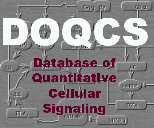
|
Enter a Search String | | Special character and space not allowed in the query term.
Search string should be at least 2 characters long. |
Molecule Parameter List for craf-1* | The statistics table lists the distribution of a molecule acting either as a substrate, product, enzyme or as a molecule within the network.
The text color of a molecule is highlighted by  color. color. | | Statistics |
Accession and Pathway Details | |
| Accession Name | Accession No. | Accession Type | Pathway Link | MAPK_network_
2003 | 50 | Network |
Shared_Object_MAPK_network_2003, PKC, PLA2,
PLCbeta, Gq, MAPK,
Ras, EGFR, Sos,
PLC_g, CaMKII, CaM,
PP1, PP2B, PKA,
AC | | This is a network model of many pathways present at the neuronal synapse. The network has properties of temporal tuning as well as steady-state computational properties. In its default form the network is bistable.Bhalla US Biophys J. 2004 Aug;87(2):745-53 |
craf-1* acting as a Molecule in MAPK_network_2003 Network
| Name | Accession Name | Pathway Name | Initial Conc.
(uM) | Volume
(fL) | Buffered | | craf-1* | MAPK_network_
2003
Accession No. : 50 | MAPK
Pathway No. : 211 | 0 | 1000 | No | | |
craf-1* acting as a Substrate for an Enzyme in MAPK_network_2003 Network
| | Enzyme Molecule /
Enzyme Activity | Accession Name | Pathway Name | Km (uM) | kcat (s^-1) | Ratio | Enzyme Type | Reagents | | 1 | MAPK* /
MAPK*-feedback | MAPK_network_
2003
Accession No. : 50 | Shared_Object_
MAPK_network_
2003
Pathway No. : 206 | 25.641 | 10 | 4 | explicit E-S complex | Substrate
craf-1*
Product
craf-1**
| | | Ueki et al JBC 269(22):15756-15761 show the presence of this step, but not the rate consts, which are derived from Sanghera et al JBC 265(1):52-57, 1990, see the deriv in the MAPK* notes. | | 2 | PPhosphatase2A /
craf-deph | MAPK_network_
2003
Accession No. : 50 | Shared_Object_
MAPK_network_
2003
Pathway No. : 206 | 15.6566 | 6 | 4.16667 | explicit E-S complex | Substrate
craf-1*
Product
craf-1
| | | See parent PPhosphatase2A for parms |
craf-1* acting as a Product of an Enzyme in MAPK_network_2003 Network
| | Enzyme Molecule /
Enzyme Activity | Accession Name | Pathway Name | Km (uM) | kcat (s^-1) | Ratio | Enzyme Type | Reagents | | 1 | PKC-active /
PKC-act-raf | MAPK_network_
2003
Accession No. : 50 | Shared_Object_
MAPK_network_
2003
Pathway No. : 206 | 66.6667 | 4 | 4 | explicit E-S complex | Substrate
craf-1
Product
craf-1*
| | | Rate consts from Chen et al Biochem 32, 1032 (1993) k3 = k2 = 4 k1 = 9e-5 recalculated gives 1.666e-5, which is not very different. Looks like k3 is rate-limiting in this case: there is a huge amount of craf locked up in the enz complex. Let us assume a 10x higher Km, ie, lower affinity. k1 drops by 10x. Also changed k2 to 4x k3. Lowerd k1 to 1e-6 to balance 10X DAG sensitivity of PKC | | 2 | PPhosphatase2A /
craf**-deph | MAPK_network_
2003
Accession No. : 50 | Shared_Object_
MAPK_network_
2003
Pathway No. : 206 | 15.6566 | 6 | 4.16667 | explicit E-S complex | Substrate
craf-1**
Product
craf-1*
| | | Ueki et al JBC 269(22) pp 15756-15761 1994 show hyperphosphorylation of craf, so this is there to dephosphorylate it. Identity of phosphatase is not known to me, but it may be PP2A like the rest, so I have made it so. |
craf-1* acting as a Substrate in a reaction in MAPK_network_2003 Network
| Kd is calculated only for second order reactions, like nA+nB <->nC or nA<->nC+nD, where n is number and A,B,C,D are molecules, where as for first order reactions Keq is calculated.
Kd for higher order reaction are not consider. |
| Name | Accession Name | Pathway Name | Kf | Kb | Kd | tau | Reagents | | Ras-act-craf | MAPK_network_
2003
Accession No. : 50 | Shared_Object_
MAPK_network_
2003
Pathway No. : 206 | 24
(uM^-1 s^-1) | 0.5
(s^-1) | Kd(bf) = 0.0208(uM) | - | Substrate
GTP-Ras
craf-1*
Product
Raf-GTP-Ras*
| | Assume the binding is fast and limited only by the amount of Ras* available. So kf=kb/[craf-1] If kb is 1/sec, then kf = 1/0.2 uM = 1/(0.2 * 6e5) = 8.3e-6 Later: Raise it by 10 X to 4e-5 From Hallberg et al JBC 269:6 3913-3916 1994, 3% of cellular Raf is complexed with Ras. So we raise kb 4x to 4 This step needed to memb-anchor and activate Raf: Leevers et al Nature 369 411-414 (I don't.... |
| Database compilation and code copyright (C) 2022, Upinder S. Bhalla and NCBS/TIFR
This Copyright is applied to ensure that the contents of this database remain freely available. Please see FAQ for details. |
|
